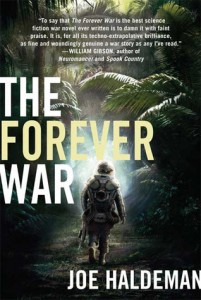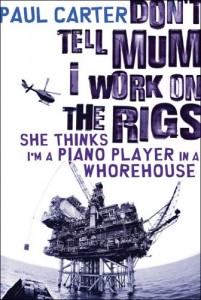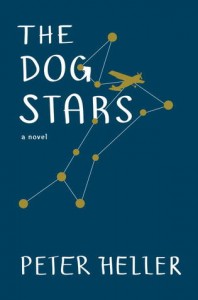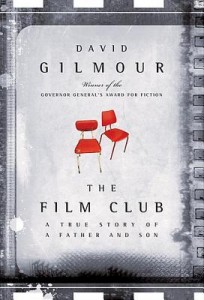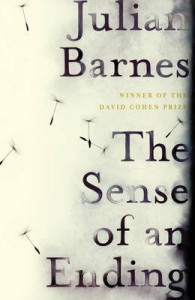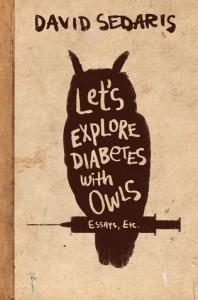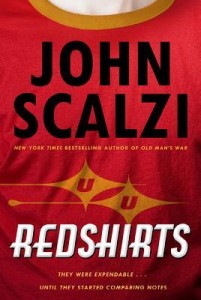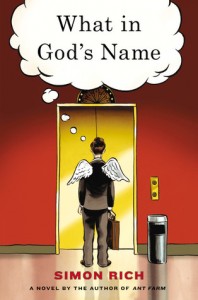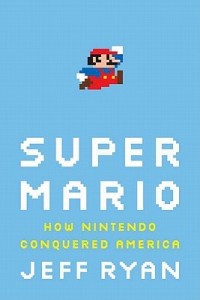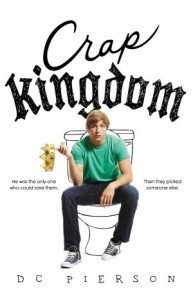Great book.
Like most great sci-fi, it relates directly to something in real life. In this case, the feeling of going to fight a war and coming back to a world that has still been moving on without you.
In this case it’s taken to the extreme. Because of some complicated theoretical physics stuff that isn’t all that important, the soldiers who leave Earth perceive time passing as normally, however 25 days of deep space deployment can end up being equal to as many years passing on Earth.
It’s interesting because you get both the perspective of the battlefield and the historical perspective at the same time. The immediacy and terror parts, and then the part where we look back on it and it’s almost meaningless. I mean, the Falklands War seems very pointless and absurd when we look back at it. And that was only about 30 years ago rather than 300. And I’m sure that to people who were there or who lost loved ones, it doesn’t seem so insignificant.
This is the kind of book I wish I’d been assigned when I was young. There are so many classics about war, but what’s nice about this book is that you can still discuss a lot of the same themes and ideas about war, but history and politics don’t get all mashed up in the discussion. And it’s okay to talk about the war in this book seeming pointless whereas people who fought in Vietnam might bristle at hearing that, even if they partially agree.
~
First, know what you’re getting here. Not an indictment of the oil industry or anything like that. A series of amusing tales related to working on oil rigs in some pretty wild locations.
It’s compulsively readable. Sort of like I Hope They Serve Beer in Hell except you don’t get that feeling that the author is trying to explain how awesome he is at any point. There are shit stories, more than one story about a monkey (although if we’re going to get picky, one story is about an orangutan, which is a great ape as opposed to a monkey, a distinction that is as stupid as it is pointless and only serves to cause people who like to prove how smart they are to correct their friends on something that does not need to be corrected. After all, how important is the exact taxonomy of an animal when the story is about how it threw feces on the glass at the zoo?)
It’s interesting to me that this kind of entertainment is often called “juvenile.” If you tell a story about crapping your pants, that story falls into the juvenile category just by nature of the fact that it’s about pants-crapping. Which really makes no sense.
What makes a story about crapping one’s pants as an adult funny is the fact that the person is an adult. If you wrote a book about your infant crapping himself on an airplane, who would be amused by that? I could see more literary tension from a book about an infant that DID NOT crap itself on a transatlantic flight. First it’s no big deal, then there’s concern about what’s building up in there, and by hour 5 things have escalated to sheer panic at 30,000 feet, waiting for the bomb. That’s some Hitchcock stuff right there.
Frankly, I think that shit stories are for grown-ups. I really do. You know what’s for kids?
I was sitting at a bar reading this very book, and I overheard what must have been a first date happening next to me.
“So, are you a religious person?”
“Well, yeah. I mean, not like going to church and stuff. This is going to sound really crazy, but I think the Native American religions are the ones that speak to me the most.”
“That doesn’t sound crazy at all, actually.”
I don’t actually know that this was a first date, but I have my suspicions because that’s the only reason I can imagine tolerating someone saying that they are into “Native American religions.” Not that those are total bullshit or anything, for all I know, but isn’t that like saying, “Oh, I believe in Asian religions”? Doesn’t “Native American religion” encompass a wide range of beliefs that would be difficult to condense into a single vision? Isn’t there probably a bigger difference between most of them than there is between Catholics and Christians? THEY PROBABLY DON’T EVEN HAVE THE SAME GUYS RUNNING SHIT! Not to mention that she sounded bored with her own answer, and then the subject was quickly dropped. So this line of talk got them exactly nowhere.
Anyway, what I’m saying is that this is what passes for ADULT conversation, even though I can’t imagine that either of them was really enjoying this exchange.
Now, it takes a special person, but if someone on a date told me their most heinous shit story, I could almost guarantee that I’d be more into her than someone who explained to me the wise ways of non-specific non-mainstream religions. That’s boring. I can read about that if I want to, and as I approach 30 I’ve become closed-minded enough to believe that if I’m really interested in something, I WILL investigate it.
On the other hand, nobody can just read a book about the time when I was 7 and crapped myself at the Grand Canyon. And I guarantee I can talk about that with far more interest and verve than I could any sort of philosophy.
I want to be entertained by other adults. I don’t mean it’s a Dance Monkey, Dance! kind of situation. Just that when talking to someone…
When meeting adults, they ask “So, what do you do?”
WHO GIVES A SHIT! THAT TELLS ME NOTHING ABOUT YOU! Tell me about the time you fell into a ditch while attempting to see some fireworks. Tell me about the time you embarrassed yourself at a wedding by accidentally collapsing a folding table. Tell me about the last terribly awkward social situation you were in. That’s fun. Even if I don’t end up being friends with you long term, at least we killed that 5 minutes with fun instead of explaining what an accounting assistant does at Stucco Rite inc.
It’s a weird argument, I know. But in all honesty, I think it’s more grown up to tell a story about peeing your pants than it is to explain how you modernized the spreadsheet as we all know it.
~
Comparisons to The Road are inevitable. Let’s face it, that book really opened a big door for literary, emotional, respectable apocalyptic fiction. And I love it dearly. So much so that I think it’s really hard for me to read a lot of apocalyptic stories. They just don’t measure up.
I know this isn’t the opinion of the entire world, but it’s how I felt when I read it, after re-reading it, and after then listening to the audiobook.
So maybe a different comparison is in order?
The writer James Galvin, author of the Meadow and some pretty great poems, also wrote a lesser-known novel called Fencing the Sky. The plot is pretty spare, basically a guy kills another guy in a moment of anger, regrets it, but makes the decision to run away on horseback.
It’s an interesting book. It comes to a slow, winding conclusion that you start dreading from the very beginning. It’s a sort of thriller, just at a slow trot instead of a gallop.
One time I got to hear Galvin speak, and he said he came up with the plot points as an excuse to keep things moving along while he described the flowers and the trees. Because that’s what he really wanted to do. That was the book he wanted to write.
The Dog Stars has a bit of a similar feel. There’s an apocalyptic element here, no doubt. But at the same time, I think the author wanted to write about the Colorado outdoors, love, and loss. The apocalyptic element seemed like a good way to distill those ideas down to their essences.
There are great moments in this book. You do care about the characters.
To bring back to a comparison to The Road, this one would be a great read for someone that maybe felt the Road was too intense, too dark. Too hopeless.
This book does have moments of levity, and there are glimmers of hope. Though the human population has been decimated by disease, the natural world is beginning to return to its natural way, and these portraits of nature and the small moments the narrator enjoys are a relief.
If I had to sum it up in one sentence: It’s the Road for people who are too kindhearted for The Road.
Which is not such a bad thing.
~
What? I read a book that isn’t a comic book? Has the world gone mad?
Well, sometimes I like to get away from my regular, capital-L literature featuring metallic men and men who fly around in jet suits and metallic men who have the metal in their skeletons instead of using it as skin.
The Film Club. Recommended to me by a friend a really long time ago, I got around to it on a trip and read most of it in two plane rides.
Welllllllll that’s not entirely true. There was also a 3-hour airport delay where I proceeded to get a little thrashed on airport beers. Can you all read after drinking? Because I really can’t. I wish I could because those are two activities that almost seem made for each other. A whiskey in one hand, some book about an eastern european gulag in the other. What could be better?
And I must say, when you’re loaded the pages FLY by. I mean, it’s almost TOO fast.
Scratch that. It IS too fast, which is probably why I didn’t retain all that much.
But what’s really weird, flipping backwards in this book, I did remember most of what had happened. Just not off the top of my head.
“Oh yeah…that’s the part where he sets up his son with beers on the porch to discourage neighbors from moving in.”
“Oh yeah…that’s the part where he and his son talk about cocaine.”
Okay, the book.
The author definitely has a gift for talking about movies. It’s the kind of book that makes you want to go back and watch some of those old terrible movies that everyone says you should watch. I usually respond to those people with a polite “BITCH do I LOOK LIKE someone who does fucking homework?” However, I sometimes carry a backpack and I have adult braces, so the answer to that one is Yes more often than I’d prefer.
The movie parts are great, but the father/son stuff fell a little flat for me. I thought it was going to be great. A son who hates school gets the chance to drop out provided he and his father watch three movies a week together? Sounds like fertile ground, no?
Well, it turns out, no.
I mean, I hated school. HATED it. I even tried that BITCH/homework line there a few times, and it was only slightly less effective than it is now. I would have dropped out to watch three movies a week, absolutely, no doubt. Hell, I would have dropped out if I had to commit three murders a week with a parent. That would have been a decent trade in my eyes.
Sadly, however, I never got the offer. And though the son in the book learns a lot about film, I would say that the remarkable thing about the whole adventure is the fact that, clearly, education beyond the 8th grade might be kinda bullshit. I don’t know for sure, I don’t know if the son is in a gutter somewhere, but I doubt it. And he seemed to be going through the same shit that we all went through at that age, namely a series of extremely painful relationships that ended in ways that were hurtful to all involved. THANK GOODNESS WE ALL STOPPED DOING THAT STUFF, HUH? HAHAHAHA! HUH!?
-ahem-
At any rate, for doing something like this, the true outcome is that it’s no big deal. It’s no big deal in that the kid seems about average.
In fact, I know a lot of people would question the wisdom of doing something like this, myself included. But on the other hand, I don’t think fathers and sons spend a ton of time together. Especially after those sons are over the age of 15. Really, the experiment here seemed to be about whether it was worth it to have a potentially drastic negative impact on your son’s life with this plan, but the benefit would be that you would have spent a good long time doing something together when he was of an age that the two of you could actually have an intelligent discussion. I feel like a lot of dads check out during this part of life. Shrug and figure there’s not much use talking to kids during those teen years.
Ultimately, the reason it all works out is because the parents obviously care about their son. They may not make all the right choices, but they think a lot about the choices they do make, and the entire book reads like a letter of love and admiration from a father to a son.
So the reading of the book didn’t do a lot for me. That said, I’m glad that someone out there did something like this. And I can’t imagine a lot of people (those with shithead dads excluded) who would prefer a high school diploma over some quality time spent with dad.
~
Um, no.
That’s not exactly a stunning review, but it summarizes how I felt.
The first third of the book is narrated by a really annoying 20-something who obviously wants people to feel he’s very intellectual. I guess there’s something to be said for the fact that Barnes got the tone dead on because it was taking me back to college when people would say “Have you read X?” as a way of saying “I’ve read X.”
So, effective, spot on, but still really annoying to read. The last thing I want to do is hear someone about age 20 waxing philosophical. Not that I’m a wise old man or anything, I just really don’t care what ANYONE thinks about whether or not history is written within an appropriate sociological context and what the implications of that may or may not be. CHALLENGE ME! Approach me in a bar and start talking about this. I’m apt to finish my drink, no matter how full or unchuggable it may be, in order to escape under the old chestnut, “I’m parched, if you’ll excuse me…YOU PIECE OF SHIT!”
That’s my game. Start polite, then the claws come out.
The book was also pretty soap opera-y. Secret babies with questionable parentage, and in the end the “reveal” is a revelation of facts, but not of emotional content. I did not give one shit, and frankly I didn’t see why the narrator did either.
To make a comparison, it would be like me remembering that in middle school I said to a kid who made fun of my backpack “I hope you die!” and then finding out he did die…but 35 years later. I probably wouldn’t feel good about it. Or maybe I would because I had a fuckin’ sweet backpack. Either way, I don’t think this makes for a really significant tale of woe.
Probably the best thing I can take away from this book is the knowledge that a book that showcases, multiple times, a scene in which a guy jacks off into a toilet can win the Man Booker prize. I don’t know what exactly that prize is, but if it’s toilet jacking they’re looking for, there’s hope for my literary aspirations yet
~
What’s to say? If you’re waiting for David Sedaris to fuck up and just not be entertaining, prepare to be disappointed.
If you’ve never read him before, you really need to get on it. I know that he’s sort associated with this precious, NPR style of storytelling, but you just have to trust me when I tell you that I can’t stand a lot of that stuff and still found myself laughing my ass off reading this last night.
There’s not much else to say about this book, although I am comfortable saying that when it comes to humor, we are so quick to excuse people. We’re so quick to say, “It’s just a matter of opinion.” Well, I’m here to tell you that’s not really true. Some things are funny and some aren’t.
I think we have a good idea about an enriched versus a surface experience when it comes to other emotions. Think about fear. There’s a difference between someone jumping out when you’re not expecting it and someone producing a horror movie that has you up all goddamn night wondering how quietly you might be able to nail boards over the windows. There’s a difference between crying because something is truly sad and because a cartoon lion dies and triggers something. Look, I know that when I start getting misty-eyed watching Rocky Balboa, that’s not the same thing as attending a funeral. Some tears are shed in both cases, but some are more rich and meaningful.
Comedy is the same way. David Sedaris writes what I consider very rich comedy. It’s not as simple as a setup and a punchline. It does a lot more than that, and that’s why I recommend his books all the time.
Okay, with that out of the way, there was one other part of this book that brought a piece of the past rushing back to me. Just before the start of the book there’s a brief author’s note. It goes like this:
Over the years I’ve met quite a few teenagers who participate in what is called “Forensics.” It’s basically a cross between speech and debate. Students take published short stories and essays, edit them down to a predetermined length, and recite them competitively. To that end, as part of the “Etc.” in this book’s subtitle, I have written six brief monologues that young people might deliver before a panel of judges. I believe these stories should be self-evident. They’re the pieces in which I am a woman, a father, and a sixteen-year-old girl with a fake British accent.
Ah, indeed. Indeed there is a thing called forensics. I know it all too well.
I don’t remember exactly how I ended up in the class. It must have been one of those things that other kids were doing, which has always been more than enough reason for me to do something as well. That thing parents say about your friends jumping off a cliff? That’s dumb. Because no, I wouldn’t jump to my doom if my friends did it. The reason I did the stuff my friends did was because some of them had girlfriends, and some of them had even gotten handjobs from these girlfriends. You can’t get a handjob when you’re dead, so cliff jumps were out of the question. HOWEVER, if my friend jumped off someone’s roof and into their swimming pool, and if this friend had gotten a handjob before, the only scientific way to make sure I would someday get a handjob was to try anything and everything he had done. So: cliff? No. Roof? Yes. Forensics? Apparently.
At our school the class was a weird hybrid of a class and an activity.
The class part was just about like any other class with the notable exception of our teacher, who we will call Ms. Hanson because that was her name. She didn’t really earn the respect of a fake name here, although I do have slight concerns of her being a murder these days, based on her behavior with kids of about 14. But she may be beyond the point of even having memories or eyeballs at this point.
She was famous for throwing temper tantrums, throwing a chair or a clipboard across the room because someone hadn’t done homework or said something disrespectful. She was infamous for announcing to our entire class that she was pregnant and then going into detail about the pregnancy being the result not of intercourse, per se, but of her significant other masturbating ON her and one of his gametes finding its way to hers.
With her at the helm, we would meet for class and then, much like the track team, we’d load up on a bus early on a Saturday and be driven off to some other school that was like the bizarro version of our own. They had amateurish mascot murals on their walls too, but theirs was a bulldog instead of a wildcat.
Upon arriving at the school, you were essentially turned loose. You’d find out when you had to perform, a couple sessions which would kill a total of about 90 minutes of the entire day, and then spend the other 10 hours screwing around.
There’s this sort of rumor, an idea swirling around that kids who are in plays and marching band are all just fucking each other like crazy. They don’t mix in with the more popular kids and instead just go at each other because why the hell not. I’m not here to say whether or not that’s true. It’s not really true for me, honestly. But it did seem like there was an awful lot of making out, switching between girlfriends, all that weird stuff. But fuck me, you had all of Saturday to do nothing else, really, and you were wearing a tie.
And I WILL say, one advantage of forensics over sports was its co-ed nature. Boys and girls on the same bus, spending the entire day wandering a school with a very low level of supervision.
I wasn’t exactly poised to be the ladykiller that could really take advantage of something like this. I had a friend who had better luck, and one young lady of the…burly persuasion was so taken with him that she bodychecked me out of the way so she could sit next to him on the bus ride home. As for me, I can remember one time going to a tournament where I thought a girl might, MIGHT, like me, and then I realized I hadn’t put on any deodorant before leaving the house and spent most of the day in the bathroom washing my armpits and trying to use the ubiquitous pink liquid soap from school bathrooms to create a sort of crusty shield between my armpit and the outside world. I don’t think this advice is necessary, but I will strongly advise against this tactic. You end up smelling like a sweaty elementary school janitor.
The acting and debating part of forensics was completely ridiculous. You’d sit in a classroom and watch teens pretend to be grown people with grown people problems. There were a few stalwart pieces, ones you saw over and over. Something called “Watermelon Boats” that sounded to me like a weird and somehow even more boring version of my mom talking to one of her friends. “The Bad Seed” where a girl pushed an old woman down the stairs to get her prized snow globe, which should have been great but really wasn’t.
One of the funniest I ever saw, looking back, was performed by a guy and a girl. They would come into the round, take their seats and pretend to be in love. Then they would perform. Their piece involved the husband character smacking the wife around, and then after they finished they would take seats again, but they would sit far apart and spend the rest of the round glaring at each other.
I must have seen dozens of fake couples involved in abusive relationships over that year. Not many pieces about older, dispassionate but happy couples picking out a lunch together.
People were taking this very seriously, I guess. I don’t know. The piece I did with a friend was some bullshit where we added on a scene of us fighting with folding chairs, and the biggest laugh we ever got came from an accidental pubescent voice crack.
It’s really silly. You put a bunch of teens on a bus. Then they act like teens and try to make out with each other. Then, for about 3 minutes they act like adults, I mean actually act like adults, as in fill the role of an adult. But even from that short few minutes you can tell they aren’t all that good at the adult thing.
I only did this for one year before deciding, as I did with most school events and activities, “Fuck this shit.”
However, being in forensics meant I was picked to be in a play by the aforementioned Ms. Hanson. A play that was a total abortion due to some serious stunt-casting, me as the captain of the football team, for instance. I was the smallest person she could find.
As an added bonus, the play included a good deal of semi-nudity. All male, of course. Three fellows were doused in cooking spray and ripped their shirts off to dance around at one point. There was a fat one, a skinny one, and a hairy one. Then there was me. Bill, the captain of the football team whose quirk was showing up in scenes with different articles of clothing missing, something that was never mentioned and that baffled the holy bejeezus out of my mom when she came to the show. (“Why did you come out on stage and take off your pants?”)
However, after the last show we had a cast party, and some crazy, stupid, stupid idiot gave a bunch of teens free reign over their backyard hot tub. Where, for the first time ever, a person that wasn’t me touched my penis.
Granted, she would later go on to allegedly do drugs, pass out near a heat register and wake up with serious brain damage, a fact I would later find out from a mutual friend and never be able to confirm. But that’s probably a monologue for another time.
~
The parts that I liked, I liked. The parts that were not so great were…not so great.
The issue is that there was a really stark separation between those parts. Without getting into the book itself, there is the main narrative, then some codas at the end. So while I enjoyed the book itself, the nearly 100 pages of coda didn’t do much for me with the exception of the last one.
So while I found the book itself to be almost great, even doing a good job of skirting the normal sci-fi trap of setting up a cool sci-fi world and then spending too much time in our world of 2000’s Los Angeles, the codas were not the easiest thing to get through. Except that last one, which I found very touching and really believe would have made an excellent standalone.
If you’re the kind of person who can read this way, read the novel, then skip to the final coda, the one titled CodaIII: the Third Person. The other two aren’t poorly written and certainly succeed in fleshing out some characters. Unfortunately, they were some of the less exciting ones. A television writer and an aimless 20-something.
Maybe it won’t be such a problem to other people. I have to acknowledge that I’m sensitive to fictional writers in books writing about writing. I don’t know why. It’s just fairly…uninteresting to me most of the time. Maybe it’s just a strong feeling that I would prefer to get the expressions that come in those types of works from other works, in another context.
I’ve always said (probably didn’t make this up, but adopted it somewhere along the way) that great science fiction disarms us so that we can look at our real-life issues in a clear way. Through the regular narrative of this book there were great opportunities to do just that. Lots of chances to talk about the ideas of writing as presented in the coda. Certainly in a less expansive way, but I honestly think the book would have benefited.
By the time I got to the end, it was like eating a great entree, then plowing through some so-so side dishes only to find that I really should have saved some more room for dessert. The final note was fantastic, but I was too full to really enjoy it.
~
Okay, the premise of this book might sound a little cheesy. Let’s face it, we live in a world where some dopey 4 year-old gets brainwashed by his even dopier dad regarding his experience in heaven, and all of a sudden we’ve got a runaway bestseller. Or some jackoff gets hit by an 18-wheeler and then lets us know what heaven is like, and we decide to buy that one too.
It seems a little odd to me that the only people who seem to glimpse heaven are those who have lost 90% of their vital fluids or haven’t been breathing for the last couple hours. I mean, I get less than 9 hours of sleep in a night and I have all kinds of side effects, but you don’t see me writing a book about them. Granted, a book about having to crap twice as frequently and getting inexplicable midday boners might not be a page-turner, but goddamnit at least it’s honest.
What In God’s Name is about some angels who have a few days to make a miracle happen, otherwise God is planning to destroy the Earth. Mostly because he’s kind of over it, but also because he’s moved on to the idea of running a really kickass Asian-Fusion restaurant.
This book probably contains my favorite portrayal of God ever. Not only because he spends an inordinate amount of resources getting Lynyrd Skynyrd back together, a project that, if successful, would definitely go a long way towards proving the existence of this Free-Bird-Loving Atheist. He’s not malicious. He just sort of seems like the upper-upper boss of most big companies, fairly detached from the day-to-day in a way that’s sort of shocking but also HAS to be the only way his existence makes any sense whatsoever.
The book reads like a romcom that, if made into a movie, I could handle. The characters aren’t overly attractive so much as they are compatible, the funny parts are actually funny and not based on some ridiculous machinations that result a father in law walking in on a guy who is trying to feed a dog worm medicine, but when the father-in-law walks in it somehow looks like the guy is fucking the dog. And there are even a couple nice moments.
In fact, this would make an excellent movie. However, I would like to make a short list of actors I’d like to ban from participating in any major roles:
Katherine Heigl: Enough already. I’ll admit, I was fooled by her…assets. By which I mean boobsets. But no more. I’ve grown up.
Reese Witherspoon: The prettier but unfunny Amy Poehler? No thanks.
Gerard Butler: The more shitty movies this guy makes, the harder it is for me to enjoy the homoeroticism of 300 in a completely hetero way.
Bradley Cooper: I like how he did a movie about doing a drug that made him a better person in every way. That’s the guy who needs it, the one who’s going from a 9.8 to a 9.9.
Sandra Bullock: Am I the only one who remembers the Net? Fondly?
Jennifer Aniston: I blame her for the stupid fliptop on Smart Water. That thing is dumb. I don’t want to drink from a baby bottle. I want to drink from an adult bottle, which is made of glass and usable as a stabbing implement in a pinch.
~
Great book for Nintendo fans. I can’t say how people who didn’t grow up with Nintendo would feel about it because, well, Nintendo was like a second father to me. Actually, more like a first father. Nintendo, for all it’s dusty-cartridge issues, was still a lot more reliable than its biological competition for World’s Best Dad for most of the 90’s.
The thing I really love about this is that I think it points out some of the things that Nintendo has done that other game makers haven’t, or that they embraced later. One of my favorites was the story of the virtual boy. This was one of the more maligned Nintendo products, and if you want to know why, watch this video: http://www.youtube.com/watch?v=UsBOqp…
Basically, you could only play it for about a half hour before getting a pretty bad headache. I recall it actually being packaged with a warning to that effect, and not a friendly warning like the Wii’s, “Hey, it’s a nice day outside, maybe we should not play so much Wii?” No, it was much more like a sign that you would see in a warehouse that warns how you will ABSOLUTELY BE CRUSHED BY THE BALER IF YOU STAND IN THIS SPOT AND NO ONE WILL MOURN YOUR PASSING.
It was a flop for a number of reasons, many which had to do with a lack of patience, such as being unwilling to wait for multicolor LED’s to come down in price.
However, Virtual Boy is credited as being the first console to have the gamepad that also featured dual joysticks, which is the absolute standard these days. PS3, Xbox360, all of them have the dual joysticks, and all of that started with Nintendo’s big flop.
Nintendo was always way ahead of the game. In fact, the Japanese version of the NES, which came out in the 80’s, was INTERNET-READY. Designers had wild ideas that people would do things like check stocks and access other forms of entertainment through their Nintendo. What a wacky idea…until maybe 30 years later when half the people I know were streaming movies one way or another.
What I also love about Nintendo, though, is that they have a true sense of care for the complete gaming experience. Probably my favorite tidbit from this book was that at one point Nintendo had to recall a bunch of consoles. They had the consoles shipped to them, then they were retrofitted with the right parts, and when consumers got their consoles back they were not only repaired, but that the stickers, which I guess a bunch of people stuck to their consoles, were replaced in the correct spots as well.
The book is full of little stuff like that. Okay, maybe one more.
When Mario was created, his creator, Miyamoto, purposely made him to be an average sort of guy. Nothing really special about him. He’s a mustachioed working man who even today still has a pot belly. But that humble beginning, it’s like a metaphor for the entirety of that company. It’s all about regular people who get to have incredible adventures
~
Before you look at the description of this book DO NOT READ THE DESCRIPTION OF THIS BOOK. OR READ ABOUT IT ANYWHERE ELSE.
As the very beginning lines point out, Tom ends up in an alternate world kingdom thingy and is its chosen one, which is what he’d always hoped for. Buuuuuuut it turns out that the kingdom pretty much sucks.
It’s a quick read, fun for people who like stuff like Zelda or have gotten a little tired of the whole thing where a guy falls into some stupid cabinet, ends up in a forest, and then has a magic sword all of a sudden.
The book has some twists and funny lines, and I honestly think I would have enjoyed it a lot more if I hadn’t heard so much about it before. The book description spoils a pretty fun reveal that doesn’t happen until over a hundred pages into the story.
This is partially my fault. I’m a fan of D.C. Pierson, especially his last book, The Boy Who Couldn’t Sleep and Never Had To. And he recently made the podcast rounds and ended up on a few shows I listen to. Between those, I heard too much about the book.
It’s a tough line. How much do you tell someone in order to get them interested in reading the book, and at what point do you start spoiling some of what makes it enjoyable? And what do you do if there’s crossover between those two points?
It reminds me of when the Matrix came out. The movie was a big deal and everything, but what people sometimes forget is that the ad campaign, the trailers, told us almost nothing. And it still turned out to be a hit. I remember thinking, “Yeah, what the hell IS the Matrix?” Part of going was almost to see what it would turn out to be, and it was win-win because if it was great, it was great. If it sucked, we could all rejoice in Nerd Rage, one of the more potent forms of stress release.
Honestly, at this point I kind of wish that things were less outlined. The internet has opened up so many ways to find media we’re interested in, I don’t know that I need to be hand fed as much. When there’s a movie coming out that I know I’m going to see (the latest Batman, for instance) I have to bend over backwards to avoid it completely before its release. Because even a brief trailer can really blow a lot of the fun. Jesus christ, bloggers, podcasters, and internet commentators are more responsible about not blowing the best parts than the creators are.
It’s not Pierson’s fault. He’s got to sell books, and I’m betting that some of the things he did (writing the names of those who pre-ordered into wrap songs, making that same podcast circuit, and so on) had a lot more impact than a lot of traditional marketing does.
The real answer, just like with everything, is that I have to take responsibility for myself, I suppose. When it comes to books, video games, movies, whatever, I just have to try picking more with less information. Especially if I KNOW I’m going to read it.
Next book by Pierson, I’ll just wait for it to hit the shelves


